Our goal is to begin next season as strongly as we finished the second half of 2014.
When Jorge is not in his zone, he'll complain a lot. But when he's in his zone, you could give him this chair or a sofa to ride and he'd win.
The mind of the rider is absolutely critical. He must believe in what he's doing. The speeds they are going are just unbelievable. So the rider factor will always remain. At the end of the day, it's the most important single factor.
Jorge has improved enormously over the years in terms of feedback, but Vale is on another level.
Being successful with four-strokes is really important to Yamaha. With a bike like the new R1, there's such a clear and obvious relation to what we're doing on the racetrack.
The R1 engine, and I know this sounds a little bit bizarre, is actually the most fuel-efficient engine Yamaha makes.
We use racing as a training ground for our engineers. The guy who designed the Tricity (a Euro-market three-wheel scooter) is the same man who designed the M1 MotoGP chassis.
When you see the relevance of our M1 race bike to the new R1 street bike, is it essential that we should race the R1 at the World Superbike level? Maybe not. The R1 is such a well-developed bike that it has changed the game a bit.
At the moment, our strategy is to attack the national championships, and to supply kit performance parts to the teams. The AMA, or what used to be called the AMA, is very important to us. As are British Superbike and German Superbike.
We need stability in the rules. Two years ago, we had a weight change that came in December.
Dumbed-down electronics would restrict our creativity, our freedom, our reason to be there. But if it is done in a right way, and we can develop that software—something that allows us enough freedom to move—then there are still some things that we can develop.
Honda threatened to leave MotoGP. Now, there is a collaboration between Honda and Yamaha on electrical software development. Years ago, you would have never seen that. We're learning from them; they're learning from us.
The show that we put on; that's what it's all about. It's man/machine, it's gladiator battles on the track. It's the action. Our technology should be adjusted so that it remains affordable and that we have quality participation and not go so crazy with technology development.
We're pretty close to Honda. There may be some aspects in which we're a little better than them, others in which they are a little better than us. I think we have closed the gap significantly. Honda started their seamless-shift at least two years before us, so I think there is an advantage there. But we're making steps.
The big difference this year fundamentally has been Marquez himself. Also, Jorge himself, because he began the season with many difficulties, while Marquez was on a roll for the first 12 races of the year.
Vale has been a phenomenon. He started the season very well, and, as the bike has progressed, he has been able to win races. He's been on a high all year. It's phenomenal.
When Wayne Rainey was in his era, in his zone, he was unbeatable. Mick Doohan with Honda was also like that.
Honda's technology was a little better than ours at the beginning of the year. And Marc felt totally at one with the bike. He was able to do amazing things on the bike—and get away with some amazing things as well. He was totally in his zone.
The biggest problem at the beginning of the season was the tire—the edge was a little too hard so it lacked feel. That's why Jorge got so frustrated at the early season test because he, more than anybody else, uses that high corner speed. He's on the edge so long. He just lost the feeling.
The big changes for 2016 will be the single software and the Michelin tires. Whenever you have regulation changes, it's an opportunity for the one who gets it right to take the lead.
Honda's engine-braking works differently than ours. With Marquez's style, he reverses the bike in and scrubs off speed in a different way. Our riders don't do that so much, so we rely more on the brakes.
Since Valentino Rossi joined Yamaha in 2003, we've haven't looked back. We've won six world championships, four for Vale and two for Jorge.











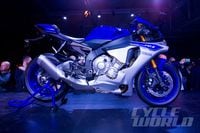



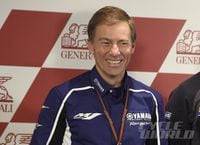
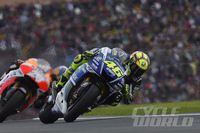
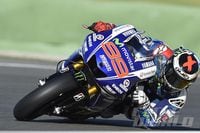
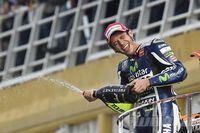
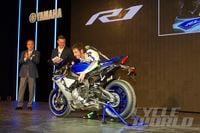
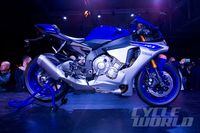
/cloudfront-us-east-1.images.arcpublishing.com/octane/QSS5DZ6SKJEU3AKE4KDAWYBEFY.jpg)
/cloudfront-us-east-1.images.arcpublishing.com/octane/SMCEQCLWRVEFTJJES6TAHB3OOQ.jpg)
/cloudfront-us-east-1.images.arcpublishing.com/octane/JCACIDCAC5FUNPTXO2BOUHGGII.jpg)
/cloudfront-us-east-1.images.arcpublishing.com/octane/DC7ZGILA2BCJXHZIUNYGV7JSEA.jpg)
/cloudfront-us-east-1.images.arcpublishing.com/octane/EWJEZUGWEZGABDEQWB64WL46GQ.jpg)
/cloudfront-us-east-1.images.arcpublishing.com/octane/5NHBMRMSFVD5JAPFNMBMNPGXQE.jpg)
/cloudfront-us-east-1.images.arcpublishing.com/octane/WHE43SCPLJBRNANAJAGXHOAIEU.jpg)
/cloudfront-us-east-1.images.arcpublishing.com/octane/6R56AQAW6NDE7BBIJ3SMCOOY5A.jpg)
/cloudfront-us-east-1.images.arcpublishing.com/octane/JMQTUE2FKZFURJTJXDMM4V47AQ.jpg)
/cloudfront-us-east-1.images.arcpublishing.com/octane/P2QYJDMQNVEANMQFXHNB3OVFKQ.jpg)
/cloudfront-us-east-1.images.arcpublishing.com/octane/VNKGXM4AA5BPRGERJOPV6GADAQ.jpg)
/cloudfront-us-east-1.images.arcpublishing.com/octane/2WS4YIFLTNG25L25WP7ZFLSWJM.jpg)
/cloudfront-us-east-1.images.arcpublishing.com/octane/UXRS6ZVQZFC23FY2EDYNT5WMVA.jpg)
/cloudfront-us-east-1.images.arcpublishing.com/octane/7JETMCKNVRGDZIGB3JCITGLPUU.jpg)
/cloudfront-us-east-1.images.arcpublishing.com/octane/OZV6E2KNIJDVHGOKXQQ2AHKLHQ.jpg)
/cloudfront-us-east-1.images.arcpublishing.com/octane/XSKMIBFZIZDN7JC6P7SMNMD3QA.jpg)
/cloudfront-us-east-1.images.arcpublishing.com/octane/ITVHWHVQ75BQBHACERYDJLPLHE.jpg)
/cloudfront-us-east-1.images.arcpublishing.com/octane/M3QRBSQ4VFEVPKYTTM3OETVFBU.jpg)
/cloudfront-us-east-1.images.arcpublishing.com/octane/H3EMT5NJ5BDZPBBH27SW3ADQH4.jpg)
/cloudfront-us-east-1.images.arcpublishing.com/octane/XTROSHDZFJB5DIJYU2VF2REFIU.jpg)
/cloudfront-us-east-1.images.arcpublishing.com/octane/7EUSM4GQEBEFTPAYZ6MOMKMMUQ.jpg)
/cloudfront-us-east-1.images.arcpublishing.com/octane/ZN44KZLHD5CHVIY3WZYAGTPGSI.jpg)
/cloudfront-us-east-1.images.arcpublishing.com/octane/5A776WXBY5GAPDYFTTUEUZNIJA.jpg)
/cloudfront-us-east-1.images.arcpublishing.com/octane/NCYHFQ2S3BAT7EC7VDN2ONGRTU.jpg)